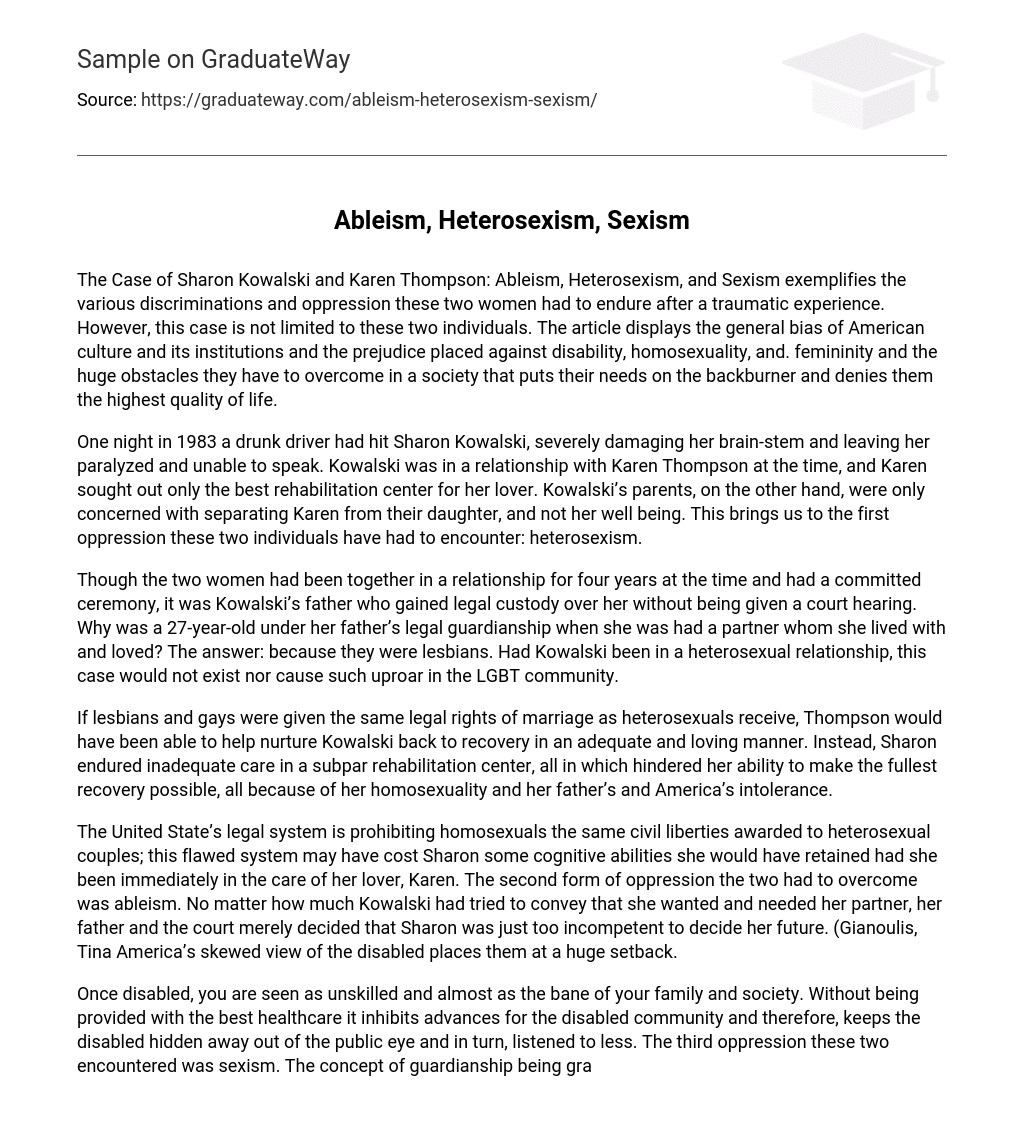The Case of Sharon Kowalski and Karen Thompson: Ableism, Heterosexism, and Sexism exemplifies the various discriminations and oppression these two women had to endure after a traumatic experience. However, this case is not limited to these two individuals. The article displays the general bias of American culture and its institutions and the prejudice placed against disability, homosexuality, and. femininity and the huge obstacles they have to overcome in a society that puts their needs on the backburner and denies them the highest quality of life.
One night in 1983 a drunk driver had hit Sharon Kowalski, severely damaging her brain-stem and leaving her paralyzed and unable to speak. Kowalski was in a relationship with Karen Thompson at the time, and Karen sought out only the best rehabilitation center for her lover. Kowalski’s parents, on the other hand, were only concerned with separating Karen from their daughter, and not her well being. This brings us to the first oppression these two individuals have had to encounter: heterosexism.
Though the two women had been together in a relationship for four years at the time and had a committed ceremony, it was Kowalski’s father who gained legal custody over her without being given a court hearing. Why was a 27-year-old under her father’s legal guardianship when she was had a partner whom she lived with and loved? The answer: because they were lesbians. Had Kowalski been in a heterosexual relationship, this case would not exist nor cause such uproar in the LGBT community.
If lesbians and gays were given the same legal rights of marriage as heterosexuals receive, Thompson would have been able to help nurture Kowalski back to recovery in an adequate and loving manner. Instead, Sharon endured inadequate care in a subpar rehabilitation center, all in which hindered her ability to make the fullest recovery possible, all because of her homosexuality and her father’s and America’s intolerance.
The United State’s legal system is prohibiting homosexuals the same civil liberties awarded to heterosexual couples; this flawed system may have cost Sharon some cognitive abilities she would have retained had she been immediately in the care of her lover, Karen. The second form of oppression the two had to overcome was ableism. No matter how much Kowalski had tried to convey that she wanted and needed her partner, her father and the court merely decided that Sharon was just too incompetent to decide her future. (Gianoulis, Tina America’s skewed view of the disabled places them at a huge setback.
Once disabled, you are seen as unskilled and almost as the bane of your family and society. Without being provided with the best healthcare it inhibits advances for the disabled community and therefore, keeps the disabled hidden away out of the public eye and in turn, listened to less. The third oppression these two encountered was sexism. The concept of guardianship being granted to a male so quickly raises the question why? In a patriarchal society one must assume that the institutions are made and catered to the male population.
In the state of Minnesota it was absolutely necessary for a woman to be accounted for by a man, especially a disabled, homosexual female. It’s this ideology that setbacks the progression for women, LGBT community and disabled persons. It was the failure of America and its legal and medical system that Sharon Kowalski did not receive the best care she needed or was provided with the same quality of life that is granted to other typical citizens. Her sexuality, gender and disabledness that separated her from the majority of Americans and therefore, the United States institution did not protect her under common liberties. disabled people, women, gay men and lesbians, and others are to some degree denied their full personhood by the structures of our society. Their choices could be denied, their sexuality controlled. ” (Griscom, Joan L. p. 417) When this case became public, many people rallied for Thompson in the gay and lesbian population, as well as in the heterosexual community. But if Karen and Sharon would have been Tom and Steve it could be determined that these two males would not have been sympathized with as easily as with Thompson and Kowalski.
Our patriarchic society embodies masculinity. Homosexual men are persecuted day in and day out due to their sexuality. The same could not be said for women, in fact, lesbians are often glamorized in popular media culture. Songs, videos and movies about girl on girl action get plenty of media coverage with enthusiasm. Most gay male coverage and media have a negative undertone compared to female homosexuality. While being a gay male has its difficulties with persecution and prejudice, ethnicity plays a pivotal role and how accepted in the community you will be.
African American males value masculinity at a much higher rate than Caucasian males. Many Black homosexuals are on “the down low” because of a fear of rejection from their community. Though White gay men experience similar reservations about coming out, they are less reluctant than their African American counterparts. The higher the education, the more accepting a group will be. Therefore, it could be that White homosexuals feel more comfortable coming out because their peers are highly educated, and in the African American community many lack a higher education, exposure and tolerance for homosexuality.





